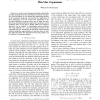62 search results - page 10 / 13 » Sporadic Control of First-Order Linear Stochastic Systems |
CDC
2010
IEEE
13 years 2 months ago
2010
IEEE
Abstract-- We consider reinforcement learning, and in particular, the Q-learning algorithm in large state and action spaces. In order to cope with the size of the spaces, a functio...
CDC
2009
IEEE
14 years 6 days ago
2009
IEEE
— In recent years, idempotent methods (specifically, max-plus methods) have been developed for solution of nonlinear control problems. It was thought that idempotent linearity o...
INFOCOM
2007
IEEE
14 years 1 months ago
2007
IEEE
—The implementation of distributed network utility maximization (NUM) algorithms hinges heavily on information feedback through message passing among network elements. In practic...
TNN
2010
13 years 2 months ago
2010
Abstract--In this paper, the problem of stochastic synchronization analysis is investigated for a new array of coupled discretetime stochastic complex networks with randomly occurr...
HYBRID
2010
Springer
14 years 2 months ago
2010
Springer
We consider an anytime control algorithm for the situation when the processor resource availability is time-varying. The basic idea is to calculate the components of the control i...

